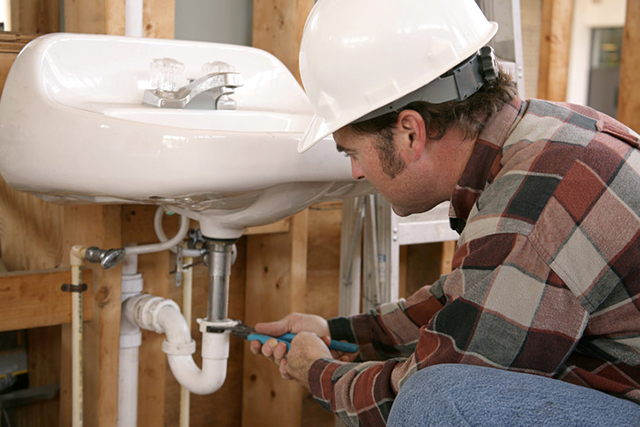A common myth is that tackling plumbing issues yourself is impossible. With the right preparation, self-education, and advice, though, the difficulty of doing your own plumbing can be minimized. The following article has advice that will assist you with plumbing repairs. Aussieelectricalandplumbing.com.au provide a quality emergency plumber Inner West to fix some problems like drain is clogged.
Don’t let your house temperature drop to below freezing and make sure to insulate anything that is exposed to the outside elements to prevent frozen pipes. Your plumbing can freeze if the air around it is below 32 degrees. In the best case scenario, you will have to wait until they thaw so that the water runs again. However, frozen pipes often burst, causing damage to your home and a hefty repair bill.
A great tip to use to stop your septic tank from backing up is to make sure you have it pumped at least every five years. Doing so will help to avoid septic tank problems by ensuring that the tank does not become clogged with sediment. Getting your septic tank drained occasionally may be expensive, but it’s dirt cheap compared to the cost of repairing a damaged septic system or the cleanup cost when raw sewage backs up into your home.

If a plunger is ineffective, you might be able to do the trick with a bucket of warm water. Once the water level gets low again, repeat the process.
If you find you are having an issue with the garbage disposal, do not put your bare hands in the disposal. Even when the garbage disposal is turned off they can be dangerous. Use a guide or the Internet to locate a blueprint of your disposal, or a troubleshooting manual.
Feel the floors around the toilets to see if they are soft; this will help you know if you have any damage. Straddle the toilet and rock from one foot to the other to see if you feel any weakening or “softness” in the floor beneath you. It could potentially save money by discovering any problems before too much damage occurs.
Avoid placing fat, grease, and other oils into your drain. Oils will eventually harden and clog up your drain. Even with a garbage disposal, you are going to cause it to be less efficient and risk drain backups. Throw away oils nowhere near the sink.
Set up a time when all plumbing work will be completed at one time. Rather than calling a plumber every time there is a minor problem, taking care of everything at once allows you to save money for additional repairs down the road. It can also save money since most plumbers will charge you by the hour. Coming out just once will cut down on the time it takes, making your bill smaller.
You can keep your bathtub pipes clear by pouring baking soda and vinegar down your drain once a month. Use one cup of each. Use a plug or rag to cover the drain, because there will be a chemical reaction in the pipes. After giving the mixture time to work, flush it out by running boiling water through the drain. This simple solution can break up clogs caused by everything from hair to soap scum.
Don’t use your toilet as a wastebasket to keep potential problems to a minimum. A lot of commonly-flushed items such as tissues, cotton balls and swabs, paper towels, diapers, and sanitary napkins can clog up a toilet by failing to dissolve properly. Use the least amount of toilet paper that you can; use just as much as necessary to properly clean yourself.
You need to make sure that your lint trap is clean for your dryer. This will ensure that your dryer operates efficiently and prevents fires. Inspect your lint trap often to see if there are any tears or holes. If there are, you can have lint getting into your pipes, and this will clog them and give you more problems that will have to be dealt with.
Prevention is vital for avoiding costly repairs to your plumbing. Clogs can be a major cause of plumbing problems. Drains are frequently clogged by hair. Stop hair from going down drains with a drain cover or screen designed for this purpose. Getting the hair off the screen is much simpler than removing it from the pipe.
Clean the aerator to adjust water pressure issues which result from sediment build up. Remove the aerator, and then take it apart so it can be cleaned with a brush that has been dipped in vinegar. Rinse your aerator, put it back together and back into the faucet. If the problem was caused by a dirty aerator, cleaning it will increase the pressure.
Stop cleaning a persistent clog with harsh drain cleaners. Drain cleaners contain harsh chemicals that can cause your pipes to corrode if you overuse them. Consider hiring a professional when you have drain problems.
If you need a plumber, check out their reviews before hiring. Certain plumbers may not have the necessary skill or experience to deal with more advanced plumbing jobs, and could make matters worse. It is always a good idea to get referrals from friends or family members, or to check out reviews about any plumber you are thinking about hiring.
As was discussed at the beginning of the article, while plumbing can be an extremely difficult chore for anyone to complete, it becomes significantly easier if you have the right advice and information. Use the advice from this article, and you’ll be on your way to doing your own plumbing.

